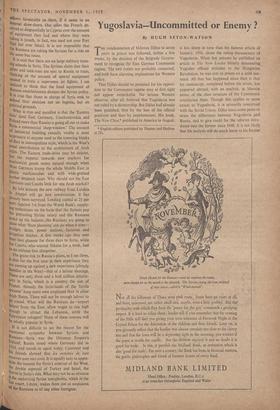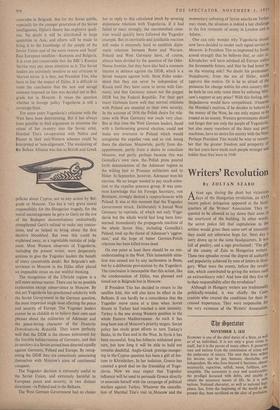Yugoslavia—Uncommitted or Enemy ?
By HUGH SETON-WATSON TEcondemnation of Milovan Djilas to seven tin in prison was followed, within a few weeks, by the decision of the Belgrade Govern- ment to recognise the East German Communist regime. The two events are probably connected, and both have alarming implications for Western policy.
That Djilas should be punished for his opposi- tion to the Communist regime may at first sight not appear remarkable. No serious Western observer, after all, believed that Yugoslavia was not ruled by a dictatorship. But Djilas had already been punished, first by the loss of his official positions and then by imprisonment. His book, The New Class,* published in America in August,
* English edition published by Thames and Hudson at 21s.
is less sharp in tone than his famous article of January, 1954, about the ruling bureaucracy of Yugoslavia. When last autumn he published an article in The New Leader bitterly denouncing Yugoslav official attitudes to the Hungarian Revolution, he was sent to prison on a mild sen- tence. All that has happened since then is that his manuscript, completed before his arrest, has appeared abroad, with an analysis, in Marxist terms, of the class structure of the Communist totalitarian State. Though this applies to some extent to Yugoslavia, it is primarily concerned with the Soviet Union. Djilas takes some pains to stress the differences between Yugoslavia and Russia, and to give credit for the reforms intro- duced into the former since 1948. It is not likely that his analysis will do much harm to his former comrades in Belgrade. But for the Soviet public, especially for the younger generation of the Soviet intelligentsia, Djilas's theory has explosive quali- ties. No doubt it will be distributed in large quantities in Asia, and efforts will be made to bring it to the knowledge of the people of the Soviet Union and of the more remote- and 'loyal' East European satellites—Rumania and Bulgaria. It is even just conceivable that the BBC's Russian Service may pay some attention to it. The Soviet leaders are extremely sensitive to any criticism in Marxist terms. It is they, not President Tito, who have to fear the impact of Djilas. It is difficult to resist the conclusion that the new and savage sentence imposed on him was decided not in Bel- grade but in Moscow. It raises the question whether in foreign policy Yugoslavia is still a sovereign State.
For some years Yugoslavia's relations with the West have been deteriorating. But it has always been possible to find arguments to minimise the extent of her re-entry into the Soviet orbit. Marshal Tito's co-operation with Nehru and Nasser in their anti-Western schemes could be interpreted as 'non-alignment.' The weakening of the Balkan Alliance was due to British and Greek policies about Cyprus, not to any action by Bel- grade or Moscow. Tito has a very grave moral responsibility for the Hungarian tragedy, for the moral encouragement he give to Gerd on the eve of the Budapest demonstrations undoubtedly strengthened Gerd's refusal to make any conces- sions, and so helped to bring about the first decisive bloodshed. But even this could be explained away, as a regrettable mistake of judg- ment. Most Western observers of Yugoslavia, including the present writer, were desperately anxious to give the Yugoslav leaders the benefit of every conceivable doubt. But Belgrade's sub- servience to Moscow in the Djilas affair placed an impossible strain on our wishful thinking.
The recognition of the Ulbricht regime is a still more serious matter. There can be no possible explanation except subservience to Moscow. By this act Yugoslavia has proclaimed solidarity with the Soviet Gove.rnment in the German question, the most important single issue affecting the peace and security of Europe. The Yugoslav leaders cannot be so childish as to believe their own cant phrases about the militarism of Adenauer and the peace-loving character of the Deutsche Demokratische Republik. They know perfectly well that the DDR is the chosen instrument for the forcible bolshevisation of Germany, and that its territory is a Soviet-armed base directed equally against Germany, Poland and Europe. By recog- nising the DDR they are consciously associating themselves with Moscow's aims of continental conquest.
The Yugoslav decision is extremely useful to the Soviet Union, and extremely harmful to European peace and security, in two distinct directions—in Poland and in the Balkans.
The West German Government had no choice but to reply to this calculated insult by severing diplomatic relations with Yugoslavia. If it had failed to react strongly, the uncommitted coun- tries would quickly have followed the Yugoslav example. But its inevitable and justifiable reaction will make it extremely hard to establish diplo- matic relations between Bonn and Warsaw. Poland and West Germany have, of course, always been divided by the question of the Oder- Neisse frontier, but they have also had a common interest in defence against the DDR, which is a Soviet weapon against both. Most Poles under- stand that they can never be independent of Russia until they have come to terms with Ger- many, and that Germany means not the puppet DDR but the Federal Republic. For their part many Gefmans know well that normal relations with Poland are essential to their own security. In the autumn of 1956 the Polish desire for rela- tions with West Germany was made very clear. But at that time the West German leaders, faced with a forthcoming general election, could not make any overtures to Poland which would antagonise the expellee vote and so risk losing them the election. Meanwhile, partly from dis- appointment, partly from a desire to conciliate Moscow, and partly perhaps because this was Gomulka's own view, the Polish press poured forth denunciations of the Adenauer regime as the willing heir to Prussian militarism and to Hitler. In September, however, Adenauer won his election. He no longer needed to pay much atten- tion to the expellee pressure group. It was com- mon knowledge that his Foreign Secretary, von Brentano, strongly desired a rapprochement with Poland. It was at this moment that the Yugoslav Government struck. Deliberately it ,forced West Germany to reprisals, of which not only Yugo- slavia but the whole world had long been fore- warned. Immediately the propaganda machine of the whole Soviet bloc, including Gomulka's Poland, took up the theme of Adenauer's 'aggres- sion,' and the hope of better German-Polish relations has been killed stone dead.
On one point at least there should be no mis- understanding in the West. This lamentable situa- tion was caused not by any tactlessness in Bonn, but by a deliberate provocation by the Yugoslays. The conclusion is inescapable that this action, like the condemnation of Djilas, was planned and timed not in Belgrade but in Moscow.
If President Tito has decided to return to the satellite fold, this will also have its effect in the Balkans. It can hardly be a coincidence that the Yugoslav move came at a time when Soviet threats to Turkey had reached a new intensity. Turkey is the one strong Western position in the whole Eastern Mediterranean. As such it has long been one of Moscow's priority targets. Soviet policy has made great efforts to turn Turkey's flanks, in the East and in the West. In Syria it has been successful. Iraq has hitherto withstood pres- sure, but how long it will be able to hold out remains doubtful. Anglo-Greek prestige-monger- ing in the Cyprus question has been a gift of for- tune to Khrushchev. In her isolation, Greece has counted a good deal on the friendship of Yugo- slavia. Now we may expect that Yugoslav influence will be used to persuade Greece directly to associate herself with the campaign of political warfare against Turkey. Whatever the cancella- tion of Marshal Tito's visit to. Moscow and the momentary softening of Soviet attacks on Turl may mean, the situation is indeed a last dialler to the few remnants of sanity in London and Athens.
One can only wonder why Yugoslavia shoi Id now have decided to render such signal service Moscow. Is President Tito so impressed by Sov jet
to
so, armed strength that he believes that, so oder
in Khrushchev will have subdued all Europe will be the foreseeable future, and that he had better
or on the winning side? No doubt his predecesi id Stojadinovic; from the era of Hitler, woi the approve this motive. Or is he so afraid of at pressures for change within his own country tl he feels he can only resist them by enlisting M os-
o, cow's support at any price? With this feeling, ti
,er Stojadinovic would have sympathised. Nhate' as the Marshal's motives, if he decides to behave be the enemy of the West, he can only expect to Id treated as an enemy. Western governments shot
ia, not forget that not only the people of Yugoslav
rty but also many members of the State and pa
st, machines, have no desire for enmity with the We
rm• Perhaps President Tito would be wise to reme of ber that the greater freedom and prosperity nd the last years have made such people stronger a bolder than they were in 1948. ey ge
in

































 Previous page
Previous page